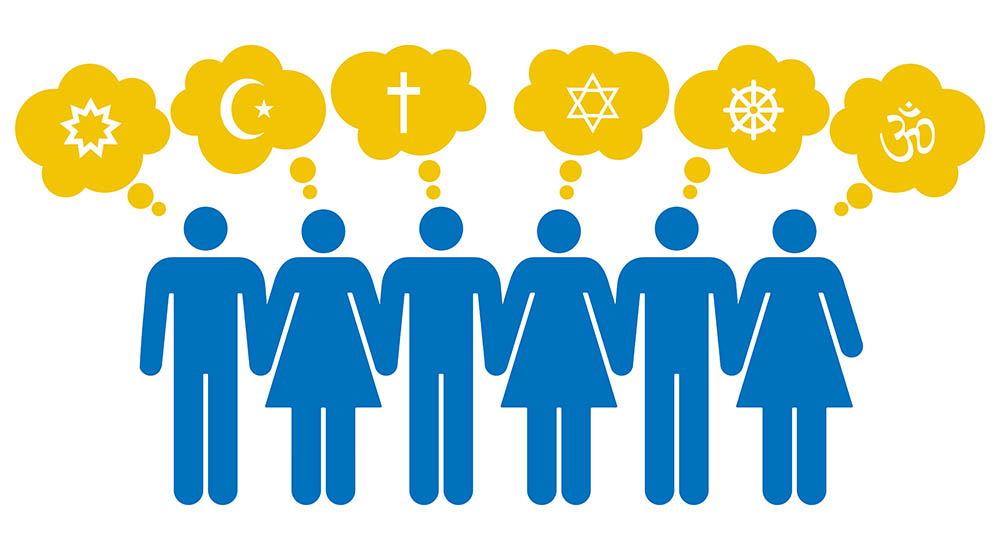
At Starr Hospice, spiritual care is among the services we provide to patients, upon request. We serve patients and families from all walks of life and cultures. With that variety comes a spectrum of strong religious traditions, more fluid spiritual connections, and those who do not hold any transcendent beliefs. We asked one of our Spiritual Care Counselors, Reverend Melissa Tumaneng, to discuss some differences between the terms religion and spirituality, and to explain the role of spiritual care in hospice.
The nature of humans has been a subject of fascination since ancient times. We desire to know ourselves and our place in the world. At times, especially toward the end of life, we look at broader questions such as: Why am I here? How will I be remembered? Why do people suffer? What is the meaning and purpose of life?
Religion and spirituality are complex concepts where it is difficult to articulate a single definition. They are complex because they have different meanings for different groups and persons. Thus to focus on one aspect of religion or spirituality should be avoided.
Traditionally, religion referred to all aspects of the human relationship to the Divine or transcendent, i.e., that which is greater than us. Scholars recently understand religion as the activities or way of life. Religions can have distinct habits, practices, or virtues as well as distinct beliefs and ways of thinking. There can be distinct purposes, passions, commitments, and desires.
Many see religion as a particular type of human activity having certain dimensions, such as: practice or ritual (e.g., prayer, meditation, worship); experiential and emotional; narrative or sacred stories; doctrine or philosophy; social and institutional; ethical and legal; and material (e.g., buildings, artifacts). Some religious traditions emphasize transcendence (beyond the physical world); others immanence (within the world). Religion is, thus, multidimensional.
We all encounter a transcendent part of life – that which takes us beyond our way of thinking, feeling, or acting. Being creative such as learning a new kind of music, mastering a foreign language, drawing or painting, and hiking in nature, are examples of self-transcendence. These are all within our reach where we can understand the processes, decisions, and abilities to achieve.
However, there is a transcendent aspect that defies understanding, comprehension, and control. Sometimes this shows up as puzzles and paradoxes of life. For example, religious people can speak of God as love and simultaneously acknowledge the presence of suffering in the world. The view of suffering in the context of God will vary markedly. This latter transcendence, the one that defies comprehension, involves a personal quality for a majority of religious people in the world. It is in our human freedom that we exercise different creativity, react differently, make choices, and pursue different goals.
 Spirituality can be defined as the experiential and personal side of a relationship to the sacred or that which is beyond us. Theologians and those who practice religion do not necessarily have a strict definition between religion and spirituality. Spirituality can be the living reality of religion as one experience by adhering to their religion. Spirituality can encompass certain themes, such as: source of ultimate meaning or purpose beyond the self; a way of understanding one’s life and how one belongs in the world; inner awareness; and personal integration.
Spirituality can be defined as the experiential and personal side of a relationship to the sacred or that which is beyond us. Theologians and those who practice religion do not necessarily have a strict definition between religion and spirituality. Spirituality can be the living reality of religion as one experience by adhering to their religion. Spirituality can encompass certain themes, such as: source of ultimate meaning or purpose beyond the self; a way of understanding one’s life and how one belongs in the world; inner awareness; and personal integration.
Spirituality involves our inner unity, how we connect with others, plus a broader reality of our ability to relate to the transcendent. We are spiritual beings; all we are and all we do are not inseparable. Spirituality can involve contact with the sacred, so it has a powerful, mysterious quality that cannot be simply reduced to one idea.
Ideally, spirituality can have a transformative effect on our lives and relationships when it takes us beyond our ordinary daily experience.
A recent term SBNR (spiritual but not religious) describes an increasing number of people in the world. Some people respond with “spiritual and religious.” How can we understand these two topics if they are in fact distinct, yet related? One way is that religion can be an add-on to spirituality, or vice-versa. Another way is spirituality as a broader construct where the quality of sacredness is experienced in religion or other modes of connecting to the Divine. However perhaps the best way to treat religion and spirituality are separate yet overlapping.
Professional Spiritual Care Counselors (SCCs) at Starr Hospice have received Masters level education related to divinity or theology; completed at least one-year hospital residency in Clinical Pastoral Education (CPE); and are ordained by and accountable to an established ordaining body.
As part of their education, SCCs have studied many religions, cultures, and ways of being spiritual. The SCCs are trained to offer a ministry of presence to the patient and family wherever they are at in their spiritual journey at end-of-life. The SCCs offer active listening, reflective presence, plus emotional, experiential, and spiritual counseling. Sometimes the response includes an appropriate religious ritual or prayer. Sometimes the response is spiritual affirmation but not religious. And other times it is neither spiritual nor religious.
In all instances, SCCs respond with compassion and a loving presence. A professional athlete works with an athletic coach to keep muscles strong and active. SCCs are encouraged to work consistently and regularly with their spiritual coach to keep their spiritual muscles honed for continuous awareness, use, and transformation.
For further reading: Nelson, James M. (2009) Psychology, Religion, and Spirituality. New York, NY: Springer.
Rev. Melissa Tumaneng, MBA, MDIV, BCC, is an active member and Board Certified Chaplain with the Association of Professional Chaplains. She was ordained by the United Church of Christ and serves on the Northern California Nevada Conference Board Council.